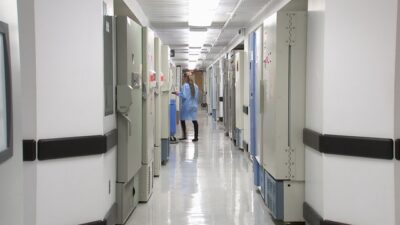Healthcare workers are suffering from unprecedented rates of burnout, fatigue, and depression since the COVID-19 pandemic started, but they may be getting some help from an unlikely source: psilocybin, the key ingredient that puts the magic in magic mushrooms.
Tony Back, an oncologist at the University of Washington, is putting together a study that will examine the effects of psilocybin on nurses struggling with their mental health. He says many providers haven’t had a chance to process everything they’ve been through over the last few years.
“Doctors and nurses just kind of turn themselves off,” Back said. “And it turns out when you do that and you do it enough, you start to feel numb, and then you can’t stop feeling numb. You feel like a zombie.”
Back believes many nurses are in the clinical range for depression, anxiety, and post-traumatic stress disorder, which can affect their career and overall quality of life. “In the long term, it can mean that you’re just really disconnected from everything,” he added.
A recent survey found that one out of every four nurses have thoughts of self-harm or that life isn’t worth living, but Back thinks the healing powers of psilocybin can help.
“One of the things that psilocybin does, it allows you to just feel those feelings because it kind of releases that top-down control that your brain can have on your emotions,” he said.
Releasing these feelings can help with numbness and depression.
“You realize you can feel all of them and it actually won’t destroy you,” Back added.
Around 30 medical providers will take part in Back’s study. One half of the participants will get psilocybin and the other half will get a placebo. But people generally know if they’ve taken a psychedelic. Back got the idea for the study after researching a previous study of psilocybin’s ability to treat anxiety and depression following a cancer diagnosis.
One of Back’s own patients, Kerry Pappas, participated in the earlier study to surprising effects.
She found psilocybin to be soothing while dealing with the aftermath of her cancer diagnosis.
“I have a thing for trees,” Pappas said while walking through a dreary forest in Seattle. “I just walk and walk and walk through the trees.”
Pappas is a retired nurse practitioner that was diagnosed with lung cancer in 2013. The disease took a dramatic toll on her physical and mental health.
“It kind of started taking over my life,” she recalled.
She found it hard to plan for the future or feel anything at all while worrying about her health. Her family was looking to move from Texas to Seattle at the time, but Pappas couldn’t summon the courage to uproot her life.
“I couldn’t move forward because this was a devastating diagnosis that I may not come out of,” Pappas said.
She felt stuck in life when she enrolled in the study looking at the psychological effects of psilocybin. She received two therapy sessions to help prepare for the experience. When she took the drug, two trained psychologists sat with her and guided her through the trip.
While on the drug, Pappas remembers being transported to an ancient environment where men with pickaxes were cutting large boulders.
“And then all of a sudden, out of the rocks came a jewel. And it represented myself. And in the meantime, I’m getting a loud, booming voice, I’ll call it. It was saying right here, right now, over and over and over and over again,” Pappas explained.
Pappas said the hallucination helped her learn not to fear death. She finally moved across the country with her family.
However, researchers say patients shouldn’t take psilocybin or magic mushrooms on their own. They will only benefit from the experience if they take it in conjunction with therapy.
Fred Barrett, a psychiatry professor and psychedelics researcher at Johns Hopkins University, says magic mushrooms may seem like the next big thing in mental health, but experts still aren’t exactly sure how it works.
“But, well, if it works, then it works, you know?” he said.
Barrett said psilocybin has only been tested in this capacity on several hundred people, so it’s too soon to tell if it is the magic bullet researchers have been looking for.
“What is pushing psychedelics forward despite those numbers are really the enormous effect sizes, especially in the treatment of mood disorders such as major depressive disorder,” Barrett said.
Taking a hallucinogen is not meant to replace traditional therapy, but it may help some people feel unstuck after months of holding back their emotions. The effects of psilocybin can last months or even years after the person receives the drug.
“It’s not necessarily all the wild and confusing things that can occur during a psychedelic experience that lead to therapeutic outcomes but personal insights that are gained in that environment,” Barret explained.
















